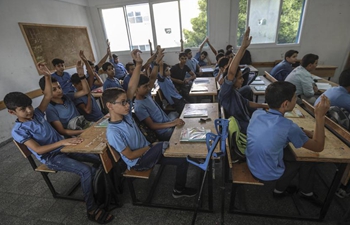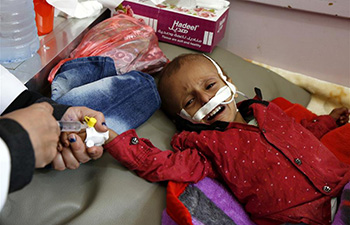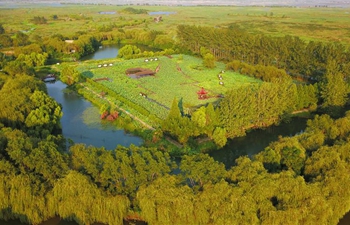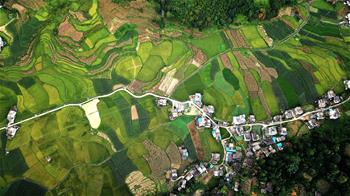by Jon Day, Yan Lei
TOKYO, Sept. 5 (Xinhua) -- Stranded passengers may be gearing up to spend a second night at Japan's Kansai International Airport in Osaka, airport officials said Wednesday evening, as evacuations in the wake of the damage caused by Typhoon Jebi which struck a day earlier, are still ongoing.
Kansai International Airport, Japan's third-largest, located on a man-made island in Osaka bay, was flooded Tuesday owing to Jebi, which caused vicious waves to inundate a runway and a terminal building, with the only way out for passengers being a bridge with road and rail access connecting the terminal to the main island.
The bridge, however, was stricken as the powerful typhoon ripped a tanker from its moorings and rammed it into the bridge, causing great damages to both and also leading to 5,000 people being forced to spend a hellish night at the airport with limited food, information and in uncomfortably humid conditions.
Of the 5,000, 3,000 were passengers and 2,000 were airport staff. The evacuations by boat began on Wednesday morning but will continue through Thursday, airport officials said.
According to China's consulate-general in Osaka, among the people stranded at the airport in Osaka, some 750 were Chinese citizens.
As of 9:00 p.m. (local time), some 550 Chinese citizens had been evacuated to Osaka City, according to the consulate-general.
The consulate-general is still providing assistance to the evacuation work of the remaining stranded passengers.
It also warned tourists and passengers to pay attention to news releases and make proper adjustments to their itineraries as the airport could remain closed for as long as a week, according the airport's authorities.
Some of those unfortunate passengers may be looking at spending a second night there, according to the latest reports, as while 4,600 people have been evacuated, 2,500 people still remain stranded at the airport as of 9:30 p.m. (local time).
Of those that were evacuated earlier in the day, their unexpected overnight stay at the airport was less than comfortable.
"The vending machines that are supposed to work and distribute food and drinks in an emergency were not working," said Sayaka Kikuchi, 48, who was intending to fly with her sister to San Francisco in the United States for a short break.
"At one point I remember being too hungry and worried to sleep," she said, adding that the airport should have done more to take care of the passengers.
More than 200 flights were canceled at the airport on Wednesday with around 30,000 people affected, airline operators said.
Some fortunate passengers, once evacuated, could make their way to Kobe Airport and reschedule their flights for the same day, but this was not the case for everyone.
Naomi Goto, 35, and a friend of a similar age were planning to spend a fortnight in paradise before Naomi's wedding a month later.
"We were planning to travel around Thailand and Cambodia with a sense of freedom and wonder. The purpose of the trip was to relax and refresh and to get rid of all our stress, particularly mine before my wedding," she said.
Goto went on to explain that she had saved really hard for the trip that wasn't to be and when she was finally able to talk with her carrier, was not able to reschedule her flight or get a refund.
"I'm utterly devastated," she said. "I may have to postpone my wedding."
There were other tales of woe from those stranded at the airport, reported to local media by the earlier evacuees and on social media sites by those lucky enough to be able to connect to the internet.
Shotaro Imai, a 32-year-old businessperson, said he was due in Singapore for a very important meeting with one of his firm's biggest clients, but Typhoon Jebi had different plans for him that could have career-damaging affects.
"I was picked by my boss to lead the sales pitch because my senior had become ill and needed a few days off work," said Imai. "This was my chance to prove to the sales team and my company in general that I could lead the team and was ready for a promotion, but because of the typhoon, I've no idea when the next chance will come."
Of all of those stranded at the airport, a few complaints were universal. A lack of food, information and humid conditions.
"I couldn't connect to the internet for some reason, this was the scariest thing for me, because the airport staff were not giving us much information," Keita Ono, a 76-year old retiree said. "Actually I was more worried about my wife at home in Hyogo Prefecture as I had no way of calling her as there was no telephone signal either."
"I think in emergencies at large public places like these, they (authorities) need to think more about the public's communication needs and have backup servers, providers and suchlike," said Ono, who had once worked for a major mobile carrier in Japan.
For many, being deprived of food and information is like being in hell, but add to that the fact that the airport's air-conditioning system failed to make the situation even worse.
"It was so humid. The air-conditioning wasn't working. It was almost as if the building was running out of oxygen, this made me feel like panicking even more. I couldn't use my phone, the staff had no information and I was dripping in sweat and struggling to breathe," Keiko Shimada, 23, recalled.
"When I arrive by boat at Kobe Airport, I've never felt so relieved. The experience was so surreal and I'm sure the airport and local authorities could have done more to evacuate us earlier or make our forced overnight stay more comfortable," she lamented.













